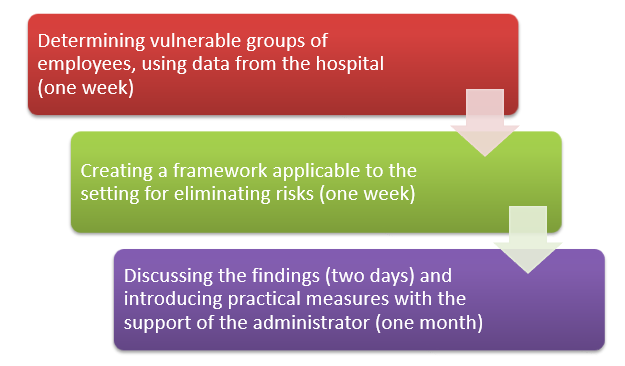Introduction
The provision of high-quality healthcare services during the pandemic is a critical initiative for guaranteeing the wellbeing of citizens while the needs of hospital employees are frequently neglected. The events of this nature are particularly seen in the area of mental health issues which are typical for personnel due to increased stress levels (Chirico et al., 2021). Therefore, it is important to examine the ways to prevent adverse outcomes among them while ensuring the continuity of care for critical patients.
Background
The selection of the topic, mental health of healthcare providers working with critical patients, is conditional upon its applicability to the needs of both patients and medical specialists. Hence, it was formulated as a challenge of a multi-faceted nature which should be a priority of corresponding organizations. For the examination of the specified problem, the suitable setting is one of the local hospitals willing to participate in the project, and the contact there will be an administrator with access to the essential information. The perceived need for this initiative is the importance of establishing new guidelines for healthcare professionals to avoid burnout or post-traumatic stress disorders, which are emphasized as the main issues stemming from workplace conditions (Chirico et al., 2021).
This necessity is supported by the previous research, according to which depression, anxiety, and insomnia, alongside the issues mentioned above, present a particular threat to female nurses (Soylu et al., 2021). Therefore, it is important to assess this category of workers in the first place and develop preventive measures applicable to them as well as other healthcare providers in the future.
SMART Goals
In order to address the challenge identified in the previous section, it is crucial to set a specific goal. In this case, it will be formulated with regard to the evidence stating that some categories of workers are more susceptible to problems in this area, and stress levels are related to a number of circumstances (Chirico et al., 2021; Soylu et al., 2021). Therefore, I will use the data received from the hospital to conclude on the most vulnerable groups of employees in terms of mental health to develop precise recommendations for preventing adverse outcomes within one week. I will create a framework applicable to the selected setting with respect to differences in specialists’ conditions within the following week. Consequently, I will spend two days discussing the findings with the administrator and decide on practical measures to be implemented within a month.
Initial Project Design

The initial project design consists of the smart goals in the pre-determined order as per the hospital’s needs. The steps include examining the available data (sick leaves, reported problems), incorporating the findings into a comprehensive plan, and coordinating actions with the facility’s representative with the subsequent implementation of the elaborated framework (see Figure 1). In this situation, responsibility will be shared between the researcher and the administrator since the former is accountable for the precision of conclusions, whereas the latter is involved in the process of delivering information. The materials for the designed project include only the records of employees’ mental health issues and their type. Considering the stages determined for its implementation, it will take about two months.
Conclusion
To summarize, the suggestion is to improve the mental health of healthcare providers working with critical patients by studying their actual problems in this area based on a single facility. These findings will be translated into practical measures with the help of its representative, and the continuation of work in this respect will, consequently, allow learning more about the possibility to prevent adverse outcomes. Thus, the developed project is based on theoretical information at the initial stage and will lead to concrete solutions.
References
Chirico, F., Nucera, G., & Magnavita, N. (2021). Protecting the mental health of healthcare workers during the COVID-19 emergency. BJPsych International, 18(1), 1-2. Web.
Soylu, V. G., Taşkın, Ö., Demir, U., & Yılmaz, A. (2021). The mental health of intensive care unit healthcare workers who care for critical patients in pandemics. Annals of Clinical and Analytical Medicine, 12(8), 903-906. Web.